Mom Diagnosed with Two Types of Cancer in One Breast Shares Her Story: 'Thankful I Listened to My Body'
Morgen Chesonis-Gonzalez was shocked to get the very rare diagnosis — and now advocates for others to get early screenings
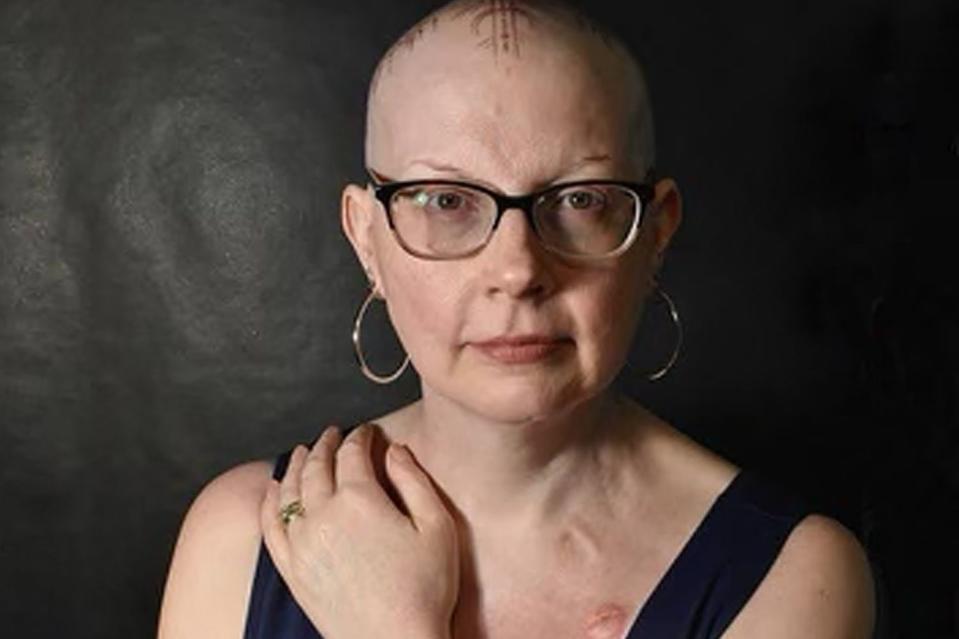
Anya Gonzalez-Quevedo
In June 2020, Morgen Chesonis-Gonzalez, then 47, decided to push off her annual mammogram. Everything had always come back fine on previous ones. But about a month later, she felt a persistent pain, and a lump about the size of a tennis ball under her arm pit.
She rescheduled her mammogram for July, and in August, she learned she had two types of breast cancer in her right breast.
“That was a surprise,” says her breast surgical oncologist, Dr. Starr Mautner, 41, at Miami Cancer Institute, part of Baptist Health South Florida. “It is very rare.”
While being diagnosed with two types of cancer is very rare, it wasn't unheard of, Chesonis-Gonzalez remembers her doctors telling her — and that made her feel better.
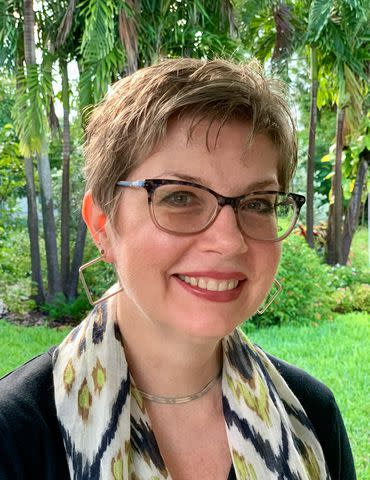
Courtesy of Morgen Chesonis-Gonzalez
Chesonis-Gonzalez now wants to share her own story to help others in the same position feel less alone — and to encourage people to schedule screenings early.
“I'm thankful that I listened to my body and was brave to make the appointments and to follow through," says Chesonis-Gonzalez, a clinical art therapist who works with school children in Miami. "If I had waited a year, it would've been catastrophic. It could have been so much worse.”
Chesonis-Gonzalez was officially diagnosed on August 20, 2020. She had two different types of cancer in her right breast: One was a triple negative, extremely aggressive, fast-moving tumor, and the other was a smaller, estrogen-positive tumor that was very very small and only detected via the breast MRI.
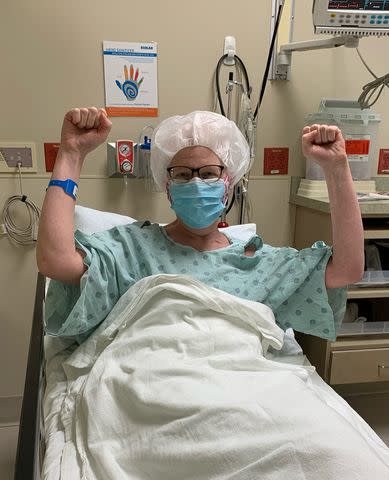
Courtesy of Morgen Chesonis-Gonzalez
Dr. Mautner says her biggest concern was treating the more aggressive tumor. Starting in September 2020, Chesonis-Gonzalez had six months of what her doctor describes as a "very harsh" chemotherapy, known as "the red devil."
"It's not an easy treatment at all," Dr. Mautner says.
But it worked: It shrunk the tumor.
While the cancer was only in one breast, for peace of mind, Chesonis-Gonzalez decided to have a double mastectomy on February 10, 2021.
"I wrote a goodbye letter to my breasts, thanking them for nursing my children, and being a part of me — but now they're trying to kill me, so we have to stop," she says.
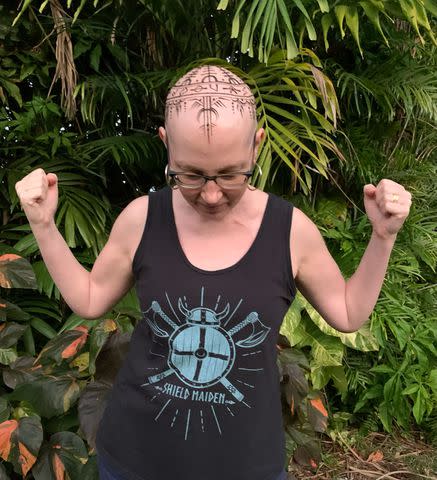
Courtesy of Morgen Chesonis-Gonzalez
After the surgery, she needed two months of physical therapy, just to be able to lift her arms above her head, so she could receive the 28 rounds of daily radiation. Her body needed the next six months to heal from the scarring, blistering and radiation damage. Then she was able to have breast reconstruction surgery.
Treatment was physically and mentally grueling, she says. To help her get through the worst days, she says she'd remind herself, "I want to see my grandkids. I want to meet them. This is what I want."
Her son and daughter, who were 13 and 11 when she was diagnosed four years ago, also had a difficult time with their mom's treatment.
"They really suffered," she says. "I think breast cancer is horrible any time, but at a non-COVID time, relatives can come. They can go and spend the night at a friend's house. They could have people hang out and go to movies. We could not. We were on house arrest, basically. They had nowhere else to go except to see me go through all of this."
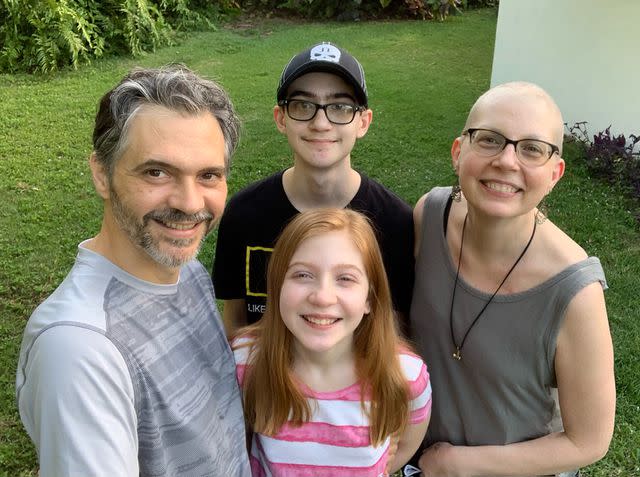
Courtesy of Morgen Chesonis-Gonzalez
Together, the family had "cat therapy" sessions where they rotated cuddling their three pet cats.
On days when she had chemo, her husband, Gerardo Gonzales Vedo, 52, would pick up pizza and they would all watch Stranger Things. "To have some bit of joy," she says. And together they laughed, a lot.
When she lost her hair from the chemo, her son started calling her "Master Oogway," the bald tortoise from Kung Fu Panda. "You develop a gallows humor as a survival skill," she says.
Her daughter took a photograph of her mother's bald head that she titled, "Survivor." She won a local art contest with the picture.
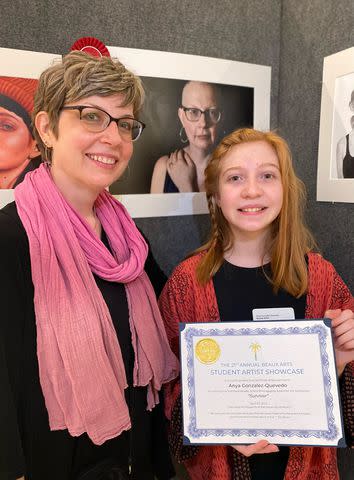
Courtesy of Morgen Chesonis-Gonzalez
"My mantra was 'Better every day,'" she says.
In August, she celebrated her four-year mark of being cancer-free. Her doctor says her prognosis is excellent. She takes daily medication to prevent a recurrence. She practices mindfulness, meditates and she and her husband go for walks at 5:30 a.m. before she goes to work. She cut back on red meat, and eats more fruits and vegetables.
She joined a dragon boat paddling group composed of other breast cancer survivors called SOS Save our Sisters; everyone on the team has gone through a similar journey.
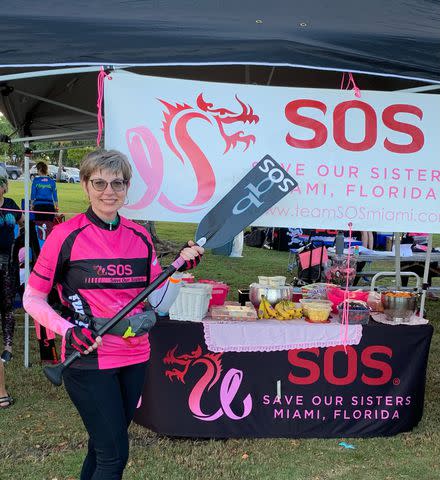
Courtesy of Morgen Chesonis-Gonzalez
"Keep moving forward," she says. "If you're a woman, and you happen to be a mom, everybody else's needs are met before your own. And I need to try and change that, not only for myself, but also advocate for that too. Because if we're not around for our children, then that's tragic."
For more People news, make sure to sign up for our newsletter!
Read the original article on People.


